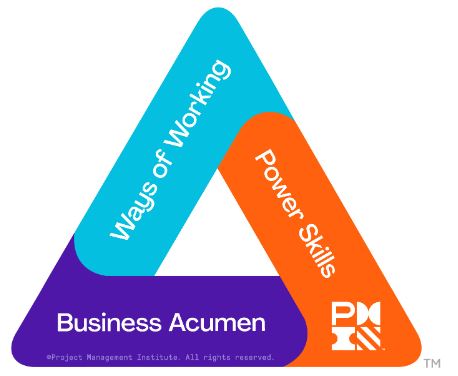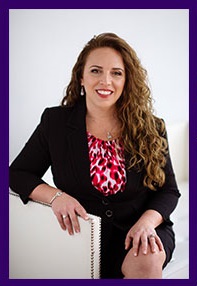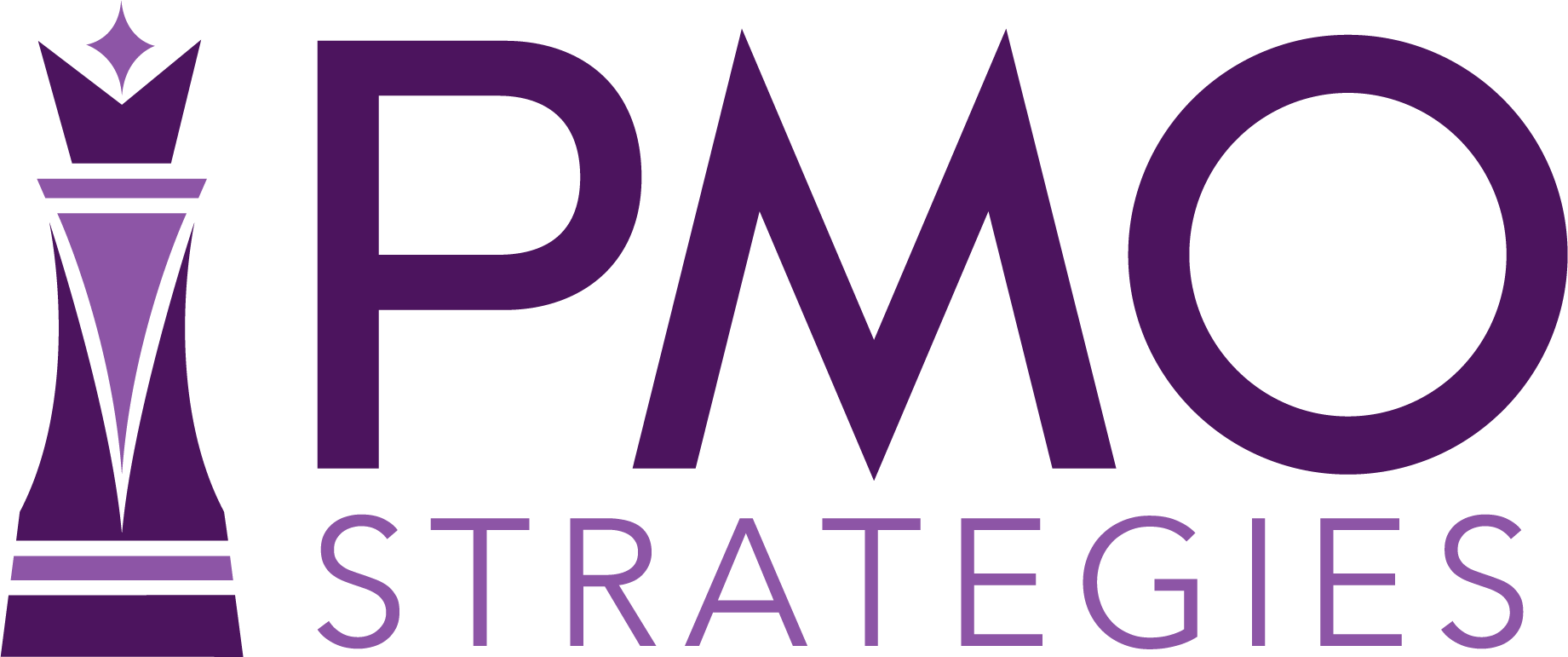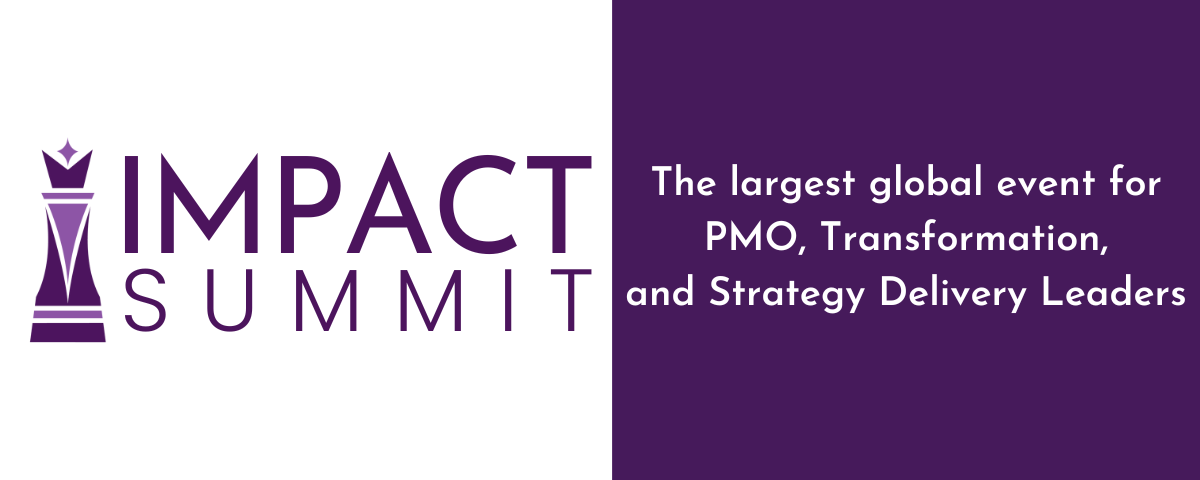
PMI Talent Triangle: Ways of Working (Technical)
Welcome to the PMO Strategies Podcast + Blog, where PMO leaders become IMPACT Drivers!
Today I am super excited to share an extremely important topic for all of us as PMO leaders and those leveraging the power of project management to make an IMPACT. We are going to be talking about the importance of mentoring, and both being a mentor and finding one. And how that can be transformational for your career, being on both sides of the fence as a mentor and a mentee. And the perfect person to talk to us about all of this is my friend, Elizabeth Harrin. Elizabeth is a healthcare project manager with over 15 years of experience in the field. She’s the author of several books about project management and I highly recommend you check them out. So we’ll make sure that we have them in the show notes for you. And she writes the award-winning blog, A Girl’s Guide to Project Management. Welcome Elizabeth. Thank you for being here today.
Laura: Elizabeth, we have been chatting as a part of your role in providing a lot of value for the PMO IMPACT Summit. As we were talking a lot about the role of women in organizations, and finding confidence, and building confidence, one of the things that we talked about, one of the pieces of really important guidance that you shared was about mentorship, and both being a mentor and finding a mentor. I thought it’d be really important to share with everyone that listens to the PMO Strategies podcast about that role of mentorship. Because it’s not just about women, it’s not just about men, it’s not just about certain environments. Everyone should have a mentor and find an opportunity to become a mentor. Can you talk to me about your experience with that and what guidance you have for people that are looking for mentorship?
Elizabeth: For me, mentorship is the relationship where you have with someone where you can talk to and be confident in the advice that you’re getting. I think you’re right, people don’t always understand what it is and how it differs from coaching. And for me, I understand it in a very simple way. Coaches will help you to uncover the solution yourself, by asking you very probing questions, or “How do you think you might be able to tackle that problem?” And things like that. Whereas a mentor would be someone you’d sit down with a cup of coffee with and say, “I’ve got this difficult challenge at work. Tell me how you’d do it.” And they would share their stories. There is a part of mentoring where you’re helping people develop their skills, and it’s fine to ask them probing questions, but I think I feel better at mentoring and coaching because I am very opinionated. And I like to share my history and tell people how to do things. So I think for me it’s a much more practical perhaps partnership than a coaching partnership, where you are building your skills through deeper analysis perhaps. Although both can be valuable. Mentoring is more common in a workplace setting, I think, because coaching seems to be something that the leaders get to do. Whereas everybody can have a mentor at any level in the organization. You can be a mentor and have a mentor at the same time, and both are fantastic opportunities for personal development.
Laura: Yeah. You know, it’s interesting that you’re saying it that way because I think that’s been my experience as well. I’ve had both mentors and coaches. And to me the coaches were always asking questions and probing, but never really shared their own experiences. And what I love about a mentoring relationship is that it’s so much more about a conversation, and sharing stories and experiences, on both sides, so that there’s a different way to learn. It’s not just let’s do some deep dive analysis on your strengths and weaknesses. And let’s do some deep dive analysis on where your problems are, and how we can correct them or any of that kind of stuff. It’s so much more about the relationship, and the trust building, and the two way conversation that, I think to me, has always been more powerful. And frankly sometimes I just want to be told, how in the heck do you make this work? And a coach isn’t supposed to do that. They’re not supposed to tell you the answers. Sometimes when I was in really difficult situations in organizations, and I used to jokingly say if there was a change resistant organization, I worked there because it was always some kind of really resistant. PMO leaders are all about bringing change to an organization. And there was so much battle, and resistance, and cultural challenges that I was dealing with. And I remember the best conversations, the best support I got, were from the people that were willing to just tell me how to make it work, as opposed to let’s analyze how your strengths and weaknesses are contributing to this. Yeah. So that was a huge benefit for me. So I’m a huge fan of mentoring.
Elizabeth: Well, I like it too and I think there is definitely a place for coaching. Mentoring is very accessible. It’s very easy to get started and it doesn’t have to be very formal. Whereas I think the relationship you have with a coach is more formal in how it is set up and the arrangements that you have. Mentoring can be you having a coffee with your manager and asking their opinion on challenges and things. It can be as easy as that. And they don’t even have to know that they’re your mentor if you don’t want to tell them. If we go back to the Greek mythology, and a mentor being the person who Odysseus sought advice from as his trusted father figure in the Odyssey, and that’s how we’ve got the word mentor. It’s just somebody wise who you sit with and have wise conversations with. I use wise in the loosest possible sense, everybody has some wisdom and knowledge that they can share. Which is why, even when I was quite young, I was still mentoring new starters in the organization because I had six months on them. I knew more than they did and I had something to share. So if you’re buddying up with someone who is a new joiner in your department or, as a manager, you are buddying two people together within your team so that the new PMO analyst has an existing PMO analyst to support them in the first six months of work. You’ve created a mentoring relationship there.
Laura: That’s really interesting that you say it that way because I think I made mentors out of all the people I wanted to learn from. Taking advantage of sometimes, one of my favorite mentors was a really, I don’t know… Some people thought of him as kind of curmudgeonly gentleman that was just really brute force, just driving things and getting things done, and really just seems so tough around the edges and all that. But he was my most important sponsor stakeholder for one of the PMOs I set up. And I got to tell you, he gave me the best advice. And it was in his best interest because I was running the PMO that was going to determine the success or failure of all of his strategic change initiatives for his entire organization. And so if I didn’t do my job well, he would have failed. And he knew it. He had a vested interest in helping me figure out how to navigate the organization, how to get things done. And he gave me some of the most brilliant advice and guidance, and looked out for me along the way. And I just thought that that was just so important. And it still sticks with me today, how he contributed to my success. So many people were afraid of him, or didn’t want to work with him, or just all of this challenging behavior that they saw, because they just didn’t reach out and ask for help. And with me, I thought he was my hero because he was always helping me navigate the organization and find the ways to get things done. I think that it’s an incredibly important role. And so if I wasn’t getting it, I just kind of, didn’t forced it on people, but I just made them my mentor. And maybe they knew and maybe they didn’t, but I would go and ask questions, and I’d get the answers I needed to move forward and be successful. So, I think that’s brilliant advice to just say, “Hey, you know what? They don’t even have to know it.”
Elizabeth: They don’t even have to know it. I mean, there are benefits to them knowing it, so they can be a bit more structured as your conversations go. But you don’t have to, if you’re just picking someone’s brain and you’re not doing it in a way that takes up too much of their time, or that they might feel that you’re encroaching on their ability to do their other work, then they are your informal mentor. You’re just getting wisdom and knowledge about how the organization works, about how PMOs work and that’s very valuable. So you can approach it in a very informal way. But of course many companies have quite formal ways of setting up mentoring schemes as well. And I’ve worked in both. Where I’ve been assigned a mentor and that work relationship worked out quite well. And I was also assigned to mentor someone, so that kind of formal scheme works. And that was something that was just within our project delivery team. It wasn’t a companywide initiative. Even if there is no formal mentoring scheme in your business, as a PMO leader, as a PMO director, you have the opportunity to say, “Well they’re my team. We’re going to do it like this.” And you can create those relationships. If your team is big enough, I think if you all work together all the time and there’s only five of you, then it doesn’t really add anything to have a formal coffee once a month or something that is your mentoring chat. But if you’re in a team, a global team, you’ve got different PMO divisions in different world regions, for example, you can buddy people or create mentoring relationships across geographies. Or if you’ve got sister companies, or you’re part of a corporation group, where there’s a different PMO in each business unit, then you could perhaps link up with other PMO leaders and create those connections as well.
Laura: You and I, I just love how we really see the world the same way and the way that a lot of our project managers and PMO see it with respect to, “Okay, all of this is great in theory, but now how do I put this in practice?” As we were talking about earlier. So what advice do you have for PMO leaders listening that are saying, “Great, okay, I definitely want to help out. How do I become a mentor and how do I mentor my team?” That’s different from managing them. So I’ve got to team of PMO leaders, or how does one take on a mentoring role for their teams?
Elizabeth: I think it’s about the quality of conversations that you have. You can do that even within a one to one meeting. So part of your role as a manager is to do the managing, which will be “What are you working on? How’s it going? What roadblocks do you have that I can help with as your manager?” All those kinds of almost transactional part of the role. Are the team doing what they need to be doing? Am I happy with outcomes? Are we hitting our value driven outputs for whatever we do as a PMO this month, whatever our priorities are. And then there’s a, “And how’s it going?” question, which is your segue into let’s have a more informal chat about how it’s going. “Tell me about working with so and so. Last month you said that you were having difficulties with that. Is that still the case? Anything? I can do to help you with, or do you want me to tell you about time where I have blah blah, blah, that might be useful for you.” And you can include in the same one-to-one meeting that you have with your team, but it’s, just in your head, taking off your, “I’m your manager, I’ve just signed off your holiday form. Yes, it’s fine for you to have two days off.” And then putting on your, “And what can I help you with? Where are you stuck?” And you could either take that into a very coaching conversation or you could take that into, actually this person just needs me to tell them five things that they could try and hopefully one of them will be useful. Or, “I know they’re about to work with that particular department and I’ve already worked with them.” Or I’m going to suggest they talk to somebody who’s already worked with them so that they are prepared for the personalities they’ll find within that team.
So I think you can do it. And I think if you start to label things as, now I’m going to be your mentor, it starts to make people feel uncomfortable. It would me, and I think that’s why, often, it is better for it not to be your line manager. You can still have those conversations as a line manager. But I think from a mentoring perspective, in my experience it works better if they, if you have someone else. Because you talked to your manager, but you might not want to talk to your manager about everything. So as the mentee, if you’ve got a challenge or if your challenge is your manager, you want someone a bit more impartial, a bit removed. Perhaps who understands the world of PMO and the challenges that you’re facing, but perhaps not somebody directly in your team or your direct line manager. So you could go a level, what I tend to do is look at my manager’s level, and think who else of his or her colleagues is approachable, models the behaviors I want to be like. Who do I think would have useful opportunities? Who could open doors for me? Who would be someone whose wisdom I would want to receive and respect. And then approach that person. So you’re going to your manager’s level, in the hierarchical structure of your organization, but not necessarily to your manager directly.
Laura: Yeah. That’s excellent. That’s excellent. I like that guidance because I think people think too much that it’s got to be this particular way. There’s only certain people you can talk to and others that you can’t, et cetera. So I think opening people’s eyes up to the fact that, “Hey listen, you can be a mentor in a very informal way, even to the people that are on your team. And it’s more about the conversation you have with them, then the structure and the formality of it. And it’s kind of taking off your manager hat.” I think that’s a really important point. Take off the manager hat and just be a human.
Elizabeth: I run a mentoring program for project managers called Project Management Rebels. And we had a call this morning and one of the questions was, “How do you do put out reporting?” And I’m like, “Oh, let me show you. I’ll call up the templates that I use. Here are three different templates.” And she went, “Oh yeah, that one looks like it could be useful because what we’re doing is this.” And what I had to show her was a template that wouldn’t be exactly right, but that between us we worked out, if she cut and pasted the part of my template, and kept some of the original template that she’s trying to use, we mashed it all up. And she thought she had something that she could then work with, and take back to her PMO to implement for the project that she was working on. And that’s what it is, it’s how can I be helpful, how can I share my experience. I have experienced to offer, even if I’m 21 and straight out of university. You have a perspective on work and life that you can bring to your colleagues in the team. I think people get hung up about all we have to go to somebody who’s higher up the organization than us, and who is older than us, and who is perceived to be the wisdom person. But actually if you start thinking more flexibly about what a mentor could look like, it’s someone with a different perspective who has useful stuff to share.
Laura: I’m really glad you brought that up because I got to tell you, many times I have learned more from those that are younger or maybe didn’t even have as much experience in an organization. And that’s the opposite of what you’d think. Certainly, I had mentors in the organization that knew the ropes, and knew how to navigate, knew the culture, knew how to survive the culture. At the same time, I also had people that I learned a lot from that were newer to the organization, and maybe weren’t stuck in the current ways of doing things, or maybe have a different perspective they’d share. And that opened up my eyes to a lot of different ways that I could engage with people, and learn new ways to operate, new ways to function, and build my own strengths. By paying attention to those that weren’t maybe colored by all of their experiences inside the organization. That’s a really important point. And I will say for me personally, I get so much out of being a mentor that I feel like I’m learning at least as much as the person that I’m mentoring. I think being a mentor, I learn more about myself. I learn more about ways that I can communicate my ideas to help others. It helps my communication skills. It helps my empathy skills. It helps my perspective. It gives me a new way to look at things. And as a teacher and as an employer or a manager, these are great ways to kind of hone your own skills and then also to remember your best advice. Because sometimes we’ll give our best advice to people, but then we’ll forget about taking it ourselves. And when you find yourself coaching someone or helping them see that, it gives you great ideas. It’s like, “Oh yeah, I’ve got to remember to do that myself as well.”
Elizabeth: Yes, exactly. I know we’re going to be a bit short on time today. So there is one thing I always wanted to share and it speaks to confidence as a mentor, even if you feel like you’ve perhaps got very little to bring to the table. And I think it ties in with some of the other conversations that were having at the PMO IMPACT Summit around confidence. This is something that changed my perspective on how I look at what I bring to the table. It’s an article by Tara Sophia Mohr. And she talks about how to frame your expertise in a way that gives you value. So you can bring to the table a lot of your experience through different angles. So, for example, you’ve lived through something, you have gone through the process, you’ve used the process, or you have been embedded in it. So if you have ever worked in a PMO before, you’ve got some experience with PMO processes. And you’ve survived that and that survival, that experience becomes your expertise and the thing that you can contribute.
Laura: I think you’ve just hit the nail on the head. And I know you’re super passionate about this topic, and I couldn’t wait to share it with everyone. I also want to give people a way that they can go deeper with you on this. So would you mind telling them about your program that you have to help people with this whole topic of mentoring?
Elizabeth: Yes. I run a mentoring program for project managers called Project Management Rebels, which is really for people who’ve done project management training courses and realize that real life doesn’t work quite like it is in the textbooks. We have webinars on real life project management skills. We have Q & A calls. We have guest speakers. And it’s all just basically a support community for people who wants to go deeper into topics, but in a very real practical way. And we share and support each other.
Laura: Oh, I love that. Oh my gosh. All of you listening today, whether you’re a project manager or PMO leader, definitely look into Elizabeth’s program because that’s definitely how I felt when I was inside organizations. And frankly it’s the reason I built a lot of the programs that I have at PMO Strategies. The normal training out there is great, and definitely helpful. And a lot of it is theory, and a lot of it doesn’t fit our personal situation. Or it’s a great foundation and then you need to be able to talk to someone and ask the real questions, which is things like, “Okay, well I’m trying this, and it’s not working now what do I do?” “Or I’m really hitting a roadblock here.’ And I bet you, you cover a lot of things around cultural changes, and dealing with different cultures, and personalities, and all of that stuff around your strengths, and stakeholder engagement and all of that.
Elizabeth: Absolutely. I mean we have, we’ve been meeting for about a year now, and the questions are always people related, stakeholder, “How do I get this person to do what they say they’re going to do? How am I going to drive accountability?” And it’s very rare that someone comes to the group and says tell me about “How to use this particular function in Microsoft project.” There’s a YouTube video for that. But there’s no YouTube videos telling you how to do the sticky stuff.
Laura: Yes, exactly. Well with that, I just want to say thank you Elizabeth for being here today. And thank you for sharing all of this wonderful and important information around what it looks like to be a mentor, how people can be involved in mentoring, and how to find a mentor. And all of that leading to your awesome PMO IMPACT Summit topic around finding your confidence and building your confidence so that you can make a greater impact in the world. Thank you so much for being here today. And I can’t wait to share you as a part of the PMO IMPACT Summit to get your message out there even further.
Elizabeth: It’s going to be great. Thanks very much for having me today.
T hanks for taking the time to check out the podcast!
hanks for taking the time to check out the podcast!
I welcome your feedback and insights!
I’d love to know what you think and if you love it, please leave a rating and review in your favorite podcast player. Please leave a comment below to share your thoughts. See you online!
Warmly,
Laura Barnard








